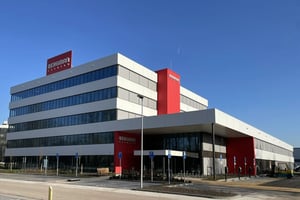Cultural diversity is a hot topic in the Dutch business world. Our society is becoming more diverse, and organisations depend on that society to buy their products and services. But adding diversity to an organisation doesn't just happen overnight: it requires patience and an ongoing commitment by its leaders. We invited Melvin Tjoe Nij of Young Global People, Ugur Özcan, until recently Executive Vice President Sales Business Clients Netherlands at Rabobank, and Daniëlle van der Burg, CEO at Zorgwerk, to respond to four statements.
Statement 1: ‘more diversity in the workplace is a necessity’
Tjoe Nij: ‘I feel that companies that do not reflect the society in which they operate are outdated. It’s not just the fact that half of the Dutch population is female; we also have large communities of people from different cultural backgrounds, an expanding immigrant population, and a growing expat community with an international focus. Any company that wants to keep on top of trends in the wider society needs to open up its workforce to a more diverse population. Diversity in terms of age, gender, cultural background and interests allows you to pick up on trends faster and more successfully and adapt your existing services to those changes. You could also say that greater diversity in the workplace leads to more creativity and more innovation, which, in turn, makes organisations stronger and more resilient.’
Van der Burg: ‘Workplace diversity makes organisations more innovative, and therefore better equipped to face the future. The market is also becoming increasingly complex, which calls for employees from different backgrounds: not just in terms of culture, age or gender, but also in terms of educational background, skills and work experience. At an individual level, diversity makes employees feel more empowered because it promotes personal growth. Employees from different backgrounds can learn a lot from each other, and an inclusive work environment also makes them more willing and able to understand others. Since we’re a healthcare provider and deal with various vulnerable populations, I feel empowerment is extremely important. We’ve actually made empowering employees our mission at Zorgwerk. By giving our employees greater control and, in doing so, improving their wellbeing in the workplace and their engagement, we also see an improvement in the quality of life of the vulnerable patients in their care. That’s why we encourage our employees to get together regularly. We organise different types of meetings where people have the opportunity to learn from each other and strengthen their bonds.’
Statement 2: ‘diverse teams perform better’
Özcan: ‘It’s good for any team to have people work in different ways, consider problems from different perspectives, and challenge each other by sharing their ideas. In that sense, diverse teams tend to perform better – in theory, anyway. But theory and reality are two different things, and experience has shown that teams with more diverse members are more prone to conflict and misunderstanding, which increases stress levels within the team. The problem with diverse teams is that people who are similar in certain ways tend to self-select into cliques within the team, and when likeminded people start forming these narrow, exclusive circles, it tends to have a polarising effect. So having a diverse team is one thing, but making that team operate effectively is quite another. This touches on the issue of fostering an inclusive corporate culture: a culture in which everyone – regardless of gender, race, disability, sexual orientation or cultural background – feels safe and is free to express their opinion. Of course, that isn’t something that can just be manufactured; it takes more than a few offsite teambuilding sessions to create that kind of culture. With a diverse team, it takes more time to build trust. Managers play a key role in creating an inclusive context: they must actively encourage their team members to disagree with each other, without judging each other or engaging in discriminating behaviour.’
Van der Burg: ‘Diverse teams perform better provided they work in a harmonious environment and in an enterprising and energetic style. And since too much diversity can upset this harmony, there needs to be unity in diversity. That’s why our organisation, Zorgwerk, has made organisational culture a key focus. Whenever we hire new people, we look if that person can add value to the current team and is a good fit for the Zorgwerk culture. Within this culture, we aim to find the right balance between 'power and love' and between 'disciplined, performance-driven and meaningful work'. When onboarding new employees, we make clear what we expect of them within our organisational culture.’
Statement 3: ‘It’s hard to attract and retain bicultural talent’
Tjoe Nij: ‘Although Dutch companies and the government have acknowledged the importance of cultural diversity in recent years and have adopted policies to that effect, most employers have been slow to make progress. Too many companies have so far failed to make cultural diversity a permanent part of their business strategies, which means it’s not consistently on the HR agenda and there’s only a small budget available – or even none at all – to support these efforts. There’s also the problem that many companies still don’t have an inclusive culture, and it shows. Finally, it’s related to recruitment policies. Hiring campaigns often show pictures of predominantly white employees. The majority of recruiters in the Netherlands are women aged 26 to 36: a homogeneous group of people who also tend to come from the same kind of background. They’re skilled at finding people from similar backgrounds, but not at finding multicultural candidates. They also don’t have access to a network of multicultural candidates, and lack knowledge of this demographic. Besides: if you interview multicultural job applicants in a strictly ‘Western’-style job interview, you can’t really assess the qualities of those applicants. That's clearly visible with traineeships, for example, where we could see a lot more people from multicultural backgrounds than is currently the case. So that’s one area where some positive change would be welcome.’
Van der Burg: ‘Zorgwerk was founded in Rotterdam, and we have since expanded and now operate throughout the Netherlands. We are firmly rooted in the multicultural society, and from the early days of our company we were able to attract bicultural talent in an authentic and organic way. Our current workforce is highly diverse in terms of cultural background. Since Zorgwerk is committed to high standards of employment practice and creates a culture in which people can be themselves, our employees are very loyal. There’s also a lot of word-of-mouth marketing from employees, which helps us to attract a lot of new bicultural talent.’
Statement 4: ‘diversity costs more money than it generates’
Özcan: ‘When I first joined Rabobank, there was little awareness there of the need to become more inclusive by hiring more women and people from bicultural backgrounds – people just sort of assumed it would happen naturally. All of that changed when (current CEO) Wiebe Draijer arrived on the scene: he made diversity a leading priority from day one. Interestingly, we conducted a diversity survey in a number of cities, including Rotterdam. We compared several city boroughs with each other and determined where our market share in the retail market could be improved. The survey revealed that our bank failed to reach certain segments of the population because we had a shortage of employees from different cultural backgrounds. Dutch Moroccans, for example, are more likely to accept advice from someone who speaks their language and shares their cultural sensibilities. Long story short, we were able to demonstrate with hard data that there is a direct correlation between a company’s diversity and profitability. Of course, Rabobank also maintains a certain social responsibility: the bank operates at the heart of society, and that’s also how it wants to present itself to the world. That’s why having an inclusive company culture is so important. You can try to more or less ‘enforce’ diversity through affirmative action, but you make a far more powerful impact if you achieve the same results with no official policies: by presenting yourself in such a way that people from different backgrounds will become interested in your organisation and want to come work for you. That’s what the ultimate objective should be.’
Van der Burg: ‘Happiness is one of our core values; it means we always aim to create positive experiences for our employees. This is not just related to work: we also regularly mark public holidays or other special days throughout the year. We’re mindful of the diversity of our people, so we celebrate with our employees not just at Easter and Christmas, but also during Eid al-Fitr (the feast of the end of Ramadan). We also consider diversity when hosting parties and other gatherings, for example by accounting for people’s dietary requirements. It’s all in the details: this could be any number of small things that all eventually generate additional expenses of some sort. We’ve noticed that these efforts are appreciated and that they greatly contribute to creating a sense of unity in our organisation. Since being a good employer is crucial in the current competitive job market, I believe investing in diversity gives your organisation a major competitive advantage.’
Melvin Tjoe Nij (born in Amsterdam in 1963) is the owner of the Young Global People recruitment platform, the largest online platform of its kind for multicultural talent in the Netherlands. He also runs The Other Network, a networking club for graduate professionals from bicultural backgrounds, and is a member of the board of the Amsterdam chapter of employers’ organisation VNO-NCW and of the advisory board of the University of Amsterdam Business School. After completing secondary school in Paramaribo, Suriname, Tjoe Nij studied Commercial Economics at The Hague University of Applied Sciences and earned a master’s degree in Financial Planning from the University of Amsterdam.
Ugur Özcan (born in Nuremberg, Germany, in 1977) worked in various positions at Rabobank over the past eight years, including as a manager of several local Rabobanks. Prior to that, he held positions at Ratiopharm, Siemens and elsewhere. Özcan studied International Economics and International Finance at the University of Amsterdam. He and co-author Henk Jan Kamsteeg are currently writing a book on inclusivity and leadership.
Daniëlle van der Burg (born in Rotterdam in 1974) has been the CEO and co-owner of B.V. Zorgwerk, the leading platform for flexible staff in the Dutch healthcare and social welfare sectors, for over 20 years. She earned a degree in Healthcare Policy & Management from Erasmus University Rotterdam. Zorgwerk has been an NPM Capital portfolio company since December 2019.













